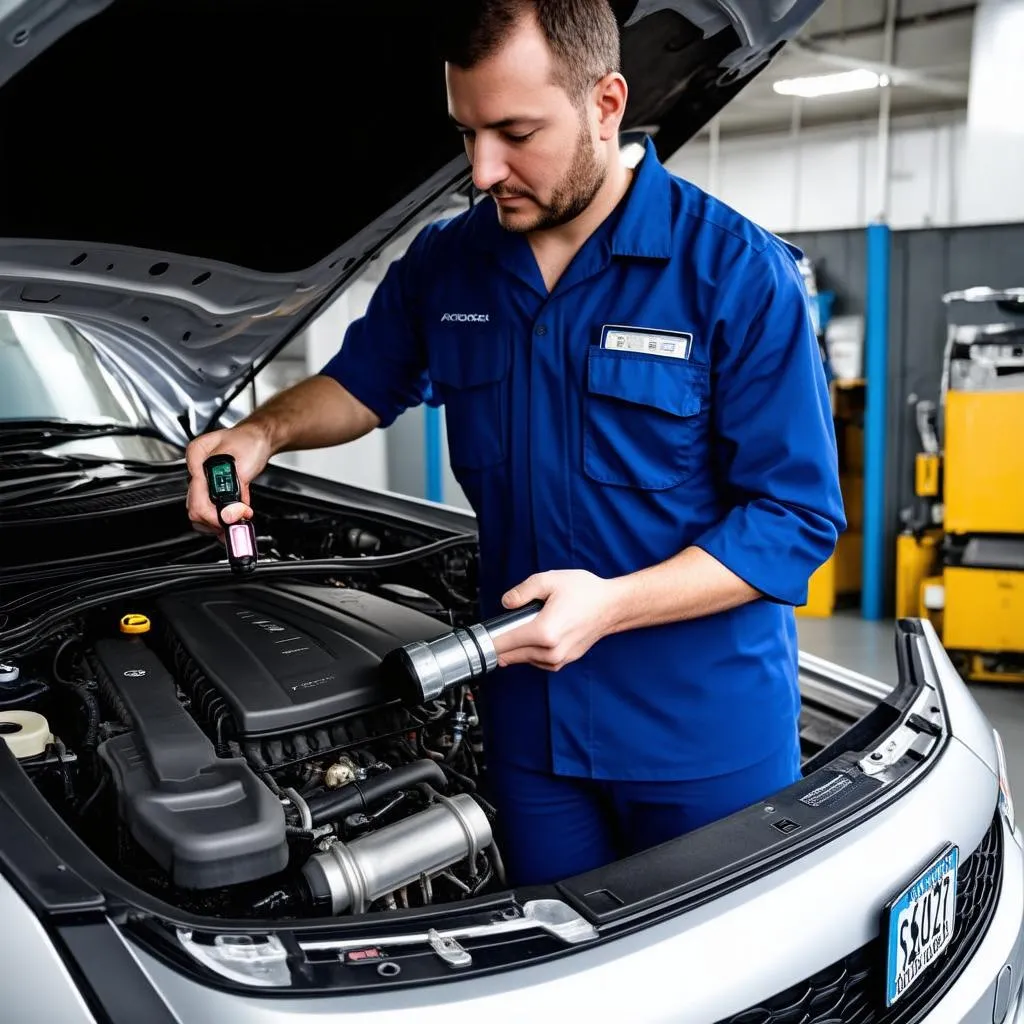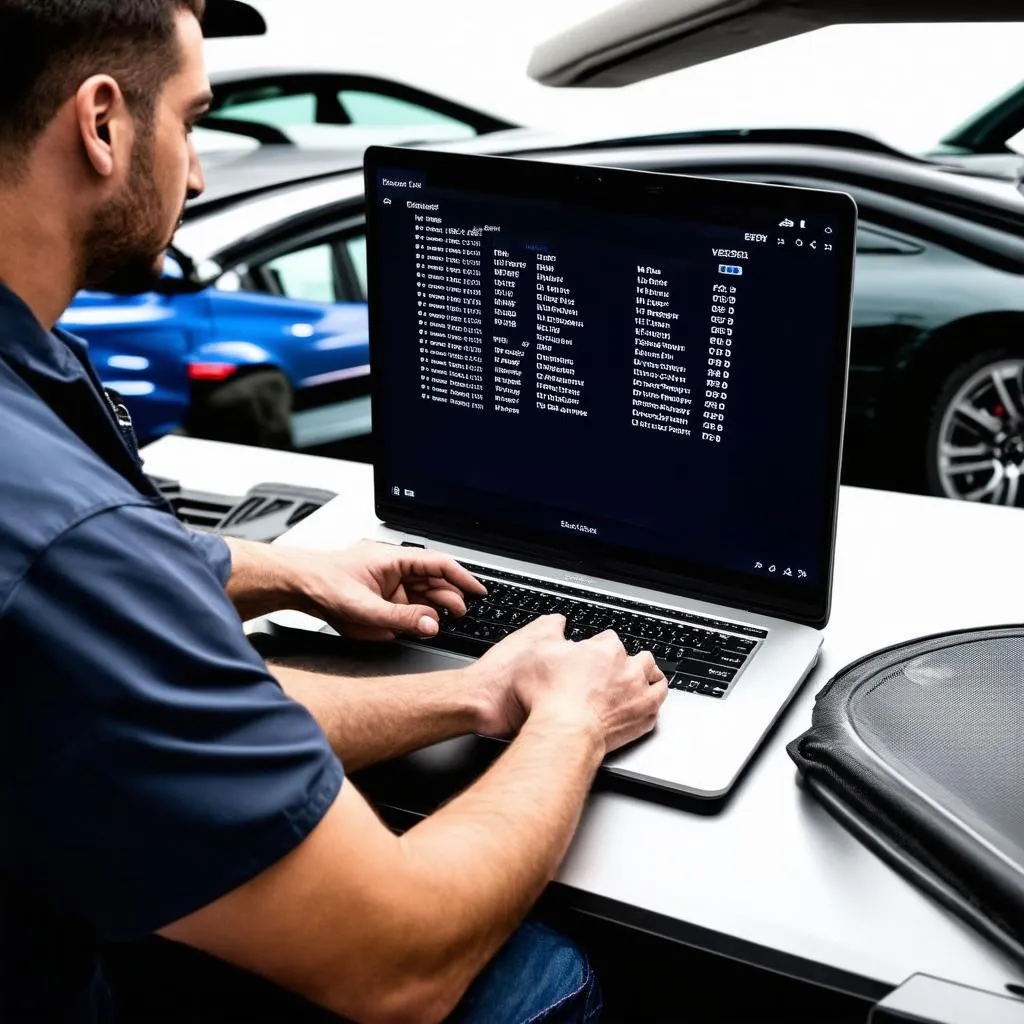“Check engine” light got you feeling like you’re driving under a bad omen? Well, don’t reach for your lucky rabbit’s foot just yet! It might be something as simple (or complex, depending on your perspective) as a pesky oxygen sensor acting up. Specifically, the dreaded OBD code P0131, which indicates a low voltage issue in your oxygen sensor circuit.
“Okay,” you’re thinking, “low voltage, oxygen sensor… but what does it all mean?”
Don’t worry, you’re not alone in this maze of car code confusion. Let’s break down this technical jargon and understand what P0131 truly signifies.
P0131: Unraveling the Enigma
What Your Car is Trying to Tell You
In essence, the OBD code P0131 signals that your car’s Engine Control Unit (ECU) has detected low voltage coming from the oxygen sensor circuit, specifically bank 1, sensor 1. This sensor plays a crucial role in monitoring the oxygen content in your exhaust fumes, which helps the ECU optimize the air-to-fuel ratio for optimal performance and fuel efficiency.
Imagine this: you’re baking a cake, and you need to get the perfect ratio of flour to sugar for that melt-in-your-mouth texture. Your oxygen sensor is like the expert baker (or a sophisticated measuring tool) that ensures the right balance in your engine’s “recipe” for combustion.
Why Should You Care?
A malfunctioning oxygen sensor can lead to a whole host of issues, such as:
- Decreased Fuel Economy: Just like an unbalanced cake recipe can lead to a dense, unpleasant cake, a faulty oxygen sensor can throw your engine’s air-to-fuel ratio out of whack, leading to wasted fuel and more frequent trips to the gas station.
- Increased Emissions: A rich air-to-fuel mixture (too much fuel) not only wastes gas but also increases harmful emissions, negatively impacting the environment.
- Poor Engine Performance: You might experience sluggish acceleration, rough idling, or even engine stalling.
Common Causes of P0131
While the P0131 code itself points to low voltage in the oxygen sensor circuit, there can be several underlying culprits:
- Faulty Oxygen Sensor: Over time, oxygen sensors can wear out, become contaminated, or get damaged, causing inaccurate readings and triggering the error code.
- Wiring Issues: Damaged, corroded, or loose wiring in the sensor circuit can disrupt the voltage flow and lead to the P0131 code.
- Exhaust Leaks: Leaks in your exhaust system can interfere with the oxygen sensor’s readings, confusing the ECU.
- Vacuum Leaks: Similar to exhaust leaks, vacuum leaks can disrupt the air-to-fuel ratio, indirectly impacting the oxygen sensor’s performance.
- Faulty ECU: While less common, a malfunctioning ECU can misinterpret sensor data and incorrectly flag the P0131 code.
Dealing with P0131: Navigating Your Options
Self-Diagnosis and Repair
While tackling car repairs yourself can be tempting, diagnosing and fixing electrical issues requires specialized knowledge and tools. If you’re comfortable working on your car and have the necessary expertise, you can try:
- Inspecting the Oxygen Sensor and Wiring: Look for any visible damage, loose connections, or corrosion.
- Checking for Exhaust Leaks: Listen for unusual hissing sounds or use a visual inspection to identify potential leaks.
- Testing the Sensor’s Voltage: This requires a multimeter and some technical know-how.
Remember, even seemingly minor electrical issues can escalate if not handled correctly. If you’re unsure about any step, it’s always best to seek professional help.
Seeking Professional Assistance
For most car owners, taking your car to a trusted mechanic specializing in European cars is the recommended course of action when dealing with OBD code P0131. They have the experience, equipment, and expertise to accurately diagnose the root cause of the problem and provide the right solution.
 car mechanic engine diagnostic
car mechanic engine diagnostic
P0131 and the Spiritual Side of Car Ownership
While the P0131 code is a purely technical issue, some car owners believe that a persistent “check engine” light can be a sign of the car trying to communicate a deeper message. In some spiritual traditions, cars are seen as extensions of ourselves, reflecting our inner state and journey.
If you find yourself repeatedly facing car troubles, it might be a good time for some introspection. Are you feeling stuck or stagnant in life? Just like a car needs regular maintenance and care, so do we. Use this as an opportunity to address any underlying emotional or spiritual blockages that might be manifesting as car problems.
Some Questions to Ponder:
- Have you been neglecting your car’s maintenance schedule?
- Are you experiencing any feelings of stress or frustration in your daily life?
- Do you feel a sense of flow and ease in your journey, or are you constantly facing roadblocks?
While these questions might seem unrelated to your car’s electrical system, they can offer valuable insights into the interconnectedness of our physical and spiritual well-being.
Beyond P0131: Other OBD Codes You Should Know
The world of OBD codes can feel like a secret language, but understanding them can empower you as a car owner. Here are a few other common codes you might encounter:
- P0171: System Too Lean (Bank 1)
- P0420: Catalyst System Efficiency Below Threshold (Bank 1)
- P0300: Random/Multiple Cylinder Misfire Detected
Familiarizing yourself with these codes can help you better communicate with your mechanic and understand the potential issues affecting your car.
Need Help Deciphering Your Car’s Language?
At techcarusa.com, we’re passionate about empowering car owners with the knowledge and resources they need to make informed decisions about their vehicles. If you’re struggling with OBD codes, need expert advice on diagnostic tools for European cars, or simply want to learn more about car maintenance, don’t hesitate to reach out. Our team of automotive enthusiasts is here to help you navigate the complex world of car repair and maintenance.
 car diagnostics computer software
car diagnostics computer software
Need Help with Diagnostics Tool Installation? Contact Us!
We understand that setting up and using diagnostic tools can be challenging. If you need assistance installing or using any diagnostic software, our team of experts is just a WhatsApp message away. Contact us at +84767531508 for 24/7 support. We’re here to help you get back on the road with confidence!
Looking for More Car Repair Insights?
Check out our other informative articles:
Don’t let car troubles dampen your spirits. Remember, knowledge is power, and understanding your car is the first step to a smoother, more enjoyable driving experience.